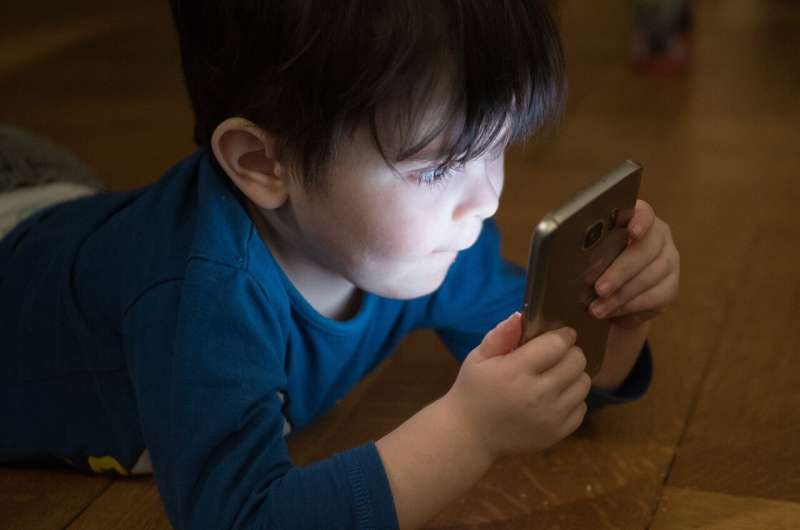
Screens have become ubiquitous in our daily lives—which means they’ve also become part of children’s lives too. So what effect does this have on children’s developing brains, especially critical language skills? To understand this, scientists in Estonia surveyed the parents of more than 400 children about their screen use, their children’s screen use, and their children’s language skills.
They found that parents who use screens a lot also have children who use screens a lot, and that children’s higher screen time is associated with poorer language skills.
“Our study reveals that children’s screen use patterns are similar to those of their parents,” said Dr. Tiia Tulviste of the University of Tartu, lead author of the study in Frontiers in Developmental Psychology.
“Child language researchers emphasize the importance of everyday interactions with adults in early language development, where children are actively involved. At the same time, we know that all family members tend to their screen devices. Because time is finite, we need to find out how this fierce competition between face-to-face interaction and screen time affects child language development.”
Talking or technology
In many cultures, most of children’s language development occurs because they talk to adults: having conversations exposes them to more vocabulary and grammatical structures. The presence of screens can disrupt this, especially if an adult is being interrupted by texts or notifications.
But understanding how this affects children’s development requires accounting for the different types of screen children may be using and what they’re using them for, as well as the screens that adults around them use.
Tulviste and co-investigator Dr. Jaan Tulviste surveyed a representative sample of Estonian families, including 421 children aged between two and a half and four years old. The survey asked parents to estimate how long each member of the family would spend using different screen devices for different purposes on a typical weekend day.
It also asked how much of this time would be spent using a screen as a family, for example, watching a film together. Finally, parents were asked to fill out a questionnaire evaluating their children’s language ability.
The researchers sorted both children and adults into three screen use groups—high, low, and moderate. They then analyzed this data to see if there was a link between parental screen use and children’s screen use.
They found that parents and children generally belonged to the same groups: parents who used screens a lot had children who also used screens a lot. Controlling for age, they looked at the language development of these children, and found that children who used screens less scored higher for both grammar and vocabulary. No form of screen use had a positive effect on children’s language skills.
“While reading ebooks and playing some educational games may offer language learning opportunities, especially for older children, research shows that during the first years of life, the most influential factor is everyday dyadic face-to-face parent-child verbal interaction,” said Tulviste.
Fun and games?
Using screens for videogames had a notable negative effect on children’s language skills, regardless of whether parents or children were gaming. Tulviste explained cultural factors could be involved in this result: “For Estonian children, few developmentally appropriate computer games exist for this age group. Games in a foreign language with limited interactivity or visual-only content likely do not provide rich opportunities for learning oral language and communication skills.”
The authors pointed out that more research will need to be done to understand how the pandemic has affected these patterns: they originally collected their data in 2019. It would also be important to learn how these whole-family profiles change over time, using longitudinal studies that follow families as children grow up.
“The study has a cross-sectional design—we studied each participant only once and did not follow their developmental trajectory over a longer time period,” cautioned Tulviste.
“Also, the data were collected before the COVID-19 pandemic. It will be interesting to look at future research findings addressing language development and the impact of screen use during the pandemic.”
More information:
Weekend screen use of parents and children associates with child language skills, Frontiers in Developmental Psychology (2024). DOI: 10.3389/fdpys.2024.1404235
Citation:
Kids in families with too much screen time struggle with language skills, study suggests (2024, September 12)
retrieved 13 September 2024
from https://medicalxpress.com/news/2024-09-kids-families-screen-struggle-language.html
This document is subject to copyright. Apart from any fair dealing for the purpose of private study or research, no
part may be reproduced without the written permission. The content is provided for information purposes only.

